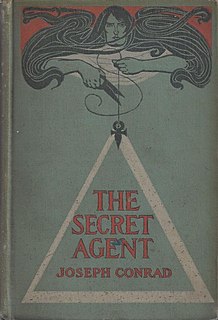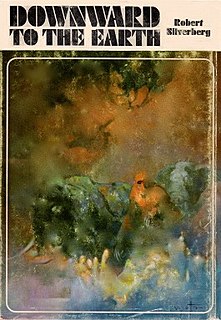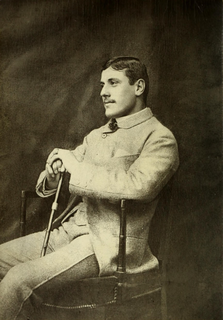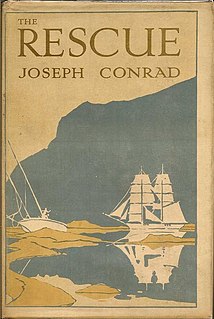
Heart of Darkness (1899) is a novella by Polish-English novelist Joseph Conrad. It tells the story of Charles Marlow, a sailor who takes on an assignment from a Belgian trading company as a ferry-boat captain in the African interior. The novel is widely regarded as a critique of European colonial rule in Africa, whilst also examining the themes of power dynamics and morality. Although Conrad does not name the river where the narrative takes place, at the time of writing the Congo Free State, the location of the large and economically important Congo River, was a private colony of Belgium's King Leopold II. Marlow is given a text by Kurtz, an ivory trader working on a trading station far up the river, who has "gone native" and is the object of Marlow's expedition.

Joseph Conrad was a Polish-British writer regarded as one of the greatest novelists to write in the English language. Though he did not speak English fluently until his twenties, he came to be regarded a master prose stylist who brought a non-English sensibility into English literature. He wrote stories and novels, many with a nautical setting, that depict trials of the human spirit in the midst of what he saw as an impassive, inscrutable universe.
Kurtz is a central fictional character in Joseph Conrad's 1899 novella Heart of Darkness. A trader of ivory in Africa and commander of a trading post, he monopolises his position as a demigod among native Africans. Kurtz meets with the novella's protagonist, Charles Marlow, who returns him to the coast via steamboat. Kurtz, whose reputation precedes him, impresses Marlow strongly, and during the return journey, Marlow is witness to Kurtz's final moments.

The Secret Agent: A Simple Tale is a novel by Joseph Conrad, first published in 1907. The story is set in London in 1886 and deals with Mr. Adolf Verloc and his work as a spy for an unnamed country. The Secret Agent is one of Conrad's later political novels in which he moved away from his former tales of seafaring. The novel is dedicated to H. G. Wells and deals broadly with anarchism, espionage, and terrorism. It also deals with exploitation of the vulnerable in Verloc's relationship with his brother-in-law Stevie, who has an intellectual disability. Conrad’s gloomy portrait of London depicted in the novel was influenced by Charles Dickens’ Bleak House.

Lord Jim is a novel by Joseph Conrad originally published as a serial in Blackwood's Magazine from October 1899 to November 1900. An early and primary event in the story is the abandonment of a passenger ship in distress by its crew, including a young British seaman named Jim. He is publicly censured for this action and the novel follows his later attempts at coming to terms with himself and his past and seeking redemption and acceptance.

Downward to the Earth is a 1970 science fiction novel by American writer Robert Silverberg. It is a tale of the quest for transcendence set on another planet, and includes references to Heart of Darkness, Joseph Conrad's classic tale of colonialism, including the name of Kurtz. Its title references Ecclesiastes 3:21 in the Bible.

Edmund Musgrave Barttelot was a British army officer, who became notorious after his allegedly brutal and deranged behaviour during his disastrous command of the rear column in the Congo during Henry Morton Stanley's Emin Pasha Relief Expedition. He has often been identified as one of the sources for the character of Kurtz in Joseph Conrad's novel Heart of Darkness.
"An Image of Africa: Racism in Conrad's Heart of Darkness" is the published and amended version of the second Chancellor's Lecture given by Chinua Achebe at the University of Massachusetts Amherst, in February 1975. The essay was included in his 1988 collection, Hopes and Impediments. The text is considered to be part of the postcolonial critical movement, which advocates to Europeans the consideration of the viewpoints of non-European nations, as well as peoples coping with the effects of colonialism.
Modern Library's 100 Best Novels is a 1998 list of the best English-language novels published during the 20th century, as selected by Modern Library from among 400 novels published by Random House, which owns Modern Library. The purpose of the list was to "bring the Modern Library to public attention" and stimulate sales of its books. A separate Modern Library 100 Best Nonfiction list of the 100 best non-fiction books of the 20th century was created the same year.

Stephanie Syjuco, is a Filipino-American conceptual artist and educator. She currently lives and works in San Francisco

The Rescue, A Romance of the Shallows (1920) is one of Joseph Conrad's works contained in what is now sometimes called the Lingard Trilogy, a group of novels based on Conrad's experience as mate on the steamer Vidar. Although it was the last of the three novels to be published, after Almayer's Folly (1895) and An Outcast of the Islands (1896), the events related in the novel precede those. The story follows Captain Tom Lingard, the recurring protagonist of The Lingard Trilogy, who was on his way to help a native friend regain his land when he falls in love with a married woman whose yacht he saves from foundering.

"Youth" is an 1898 autobiographical short story by Joseph Conrad published in Blackwood's Magazine, and then included as the first story in Conrad's 1902 volume Youth, a Narrative, and Two Other Stories. This volume also includes Heart of Darkness and The End of the Tether, stories concerned with the themes of maturity and old age, respectively. "Youth" depicts a young man's first journey to the East. It is narrated by Charles Marlow who is also the narrator of Lord Jim, Chance, and Heart of Darkness. The narrator's introduction suggests this is the first time, chronologically, the character Marlow appears in Conrad's works.

Apocalypse Now is a 1979 American epic psychological war film directed and produced by Francis Ford Coppola and starring Marlon Brando, Robert Duvall, Martin Sheen, Frederic Forrest, Albert Hall, Sam Bottoms, Laurence Fishburne, and Dennis Hopper. The screenplay, co-written by Coppola and John Milius with narration written by Michael Herr, is loosely based on the 1899 novella Heart of Darkness by Joseph Conrad, with the setting changed from late 19th-century Congo to the Vietnam War. The film follows a river journey from South Vietnam into Cambodia undertaken by Captain Benjamin L. Willard, who is on a secret mission to assassinate Colonel Kurtz, a renegade Army Special Forces officer accused of murder and who is presumed insane.
Charles Marlow is a fictional English seaman and recurring character in the work of novelist Joseph Conrad.
Heart of Darkness is a chamber opera in one act by Tarik O'Regan, with an English-language libretto by artist Tom Phillips, based on the 1899 novella of the same name by Joseph Conrad. It was first performed in a co-production by Opera East and ROH2 at the Linbury Theatre of the Royal Opera House in London on 1 November 2011 directed by Edward Dick. In May, 2015, the opera received its North American premiere in a production by Opera Parallèle, presented by Z Space in San Francisco, California.
Robert Gavin Hampson FEA FRSA is a British poet and academic. Hampson was born and raised in Liverpool, studied in London and Toronto and settled in London. He is currently Research Fellow at the Institute for English Studies, University of London; Emeritus Professor at Royal Holloway; and Visiting Professor at the University of Northumbria. He is a member of the Poetics Research Centre and the Centre for GeoHumanities at Royal Holloway. He is known for his contributions to contemporary innovative poetry and the international study of Joseph Conrad.
The Project Formerly Known as Kindle Forkbomb is a work done by the Swiss-Austrian-American duo known as Ubermorgen. The artists are known for their creative use of digital media, combined with other means such as performance and various offline medium to convey their ideas. The project is showcased on Ubermorgen's website "http://ubermorgen.com/uuuuuuuntitled.com/" and was initially shown at Kunsthal Aarhus in the Show "Systemics #2: As we may think " and at DAM Gallery Berlin, both in 2013.

Paul Soulellis is an American graphic designer, artist, and educator. His writings and work in the field of experimental publishing and network culture are cited in influential scholarly research. His publications are collected and exhibited worldwide and on the internet. He works in New York City and Providence, Rhode Island.

"Heart of Darkness" was an American television play broadcast on November 6, 1958, as part of the CBS television series, Playhouse 90. It was the seventh episode of the third season of Playhouse 90. The play was adapted from Joseph Conrad's short story, Heart of Darkness.

The Hearts of Darkness: How White Writers Created the Racist Image of Africa is a 2003 non-fiction book by Milton Allimadi.













